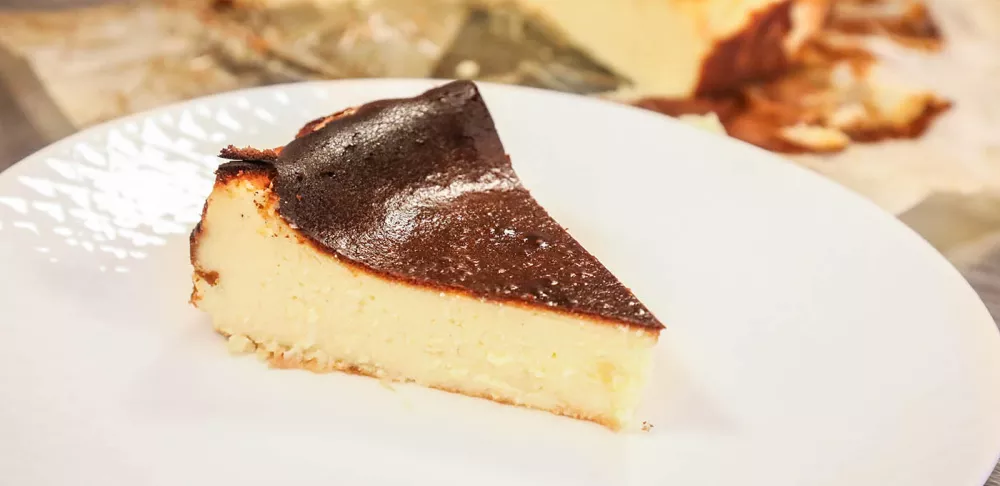Social media has been seeing a surge of Basque-style cheesecakes far and wide.
And for good reason — intentionally burnt at a high heat to provide a contrast in flavors, the end result of this Basque cheesecake recipe is similar to that of a soufflé (read: rich and gooey).
It’s super easy to make — just ask ICE’s Pastry & Baking Arts Chef-Instructor, Eric McIntyre.
“It’s easy in the sense that, if you burn it, it’s intended,” he says. “You monitor it much less.”
Unlike its stateside cousin across the pond, Basque-style cheesecake also doesn’t have a crust. (Honestly, it doesn’t need it.)
Chef Eric’s first attempt at a Basque cheesecake recipe was during his Facebook tenure.
“We did a lot of regional menus that changed on a day-to-day basis either based on region, cuisine or theme, and one day we had a Basque day," he says.
One of Chef Eric's pro tips for the best burnt Basque cheesecake: leave the cream cheese out overnight to ensure maximum softness.
“Find an addition, either with crème fraîche, sour cream or other cultured cream to give it an additional backbone or edge,” he also suggests. “In my world, I make my own crème fraîche, which we did for this recipe.”
Heard, Chef. Here’s how to make Basque-style cheesecake at home:

Ingredients
- 1080 grams cream cheese, softened
- 324 grams granulated sugar
- 1 lemon
- 1 vanilla bean, split and scraped (alternatively, 1 1/2 teaspoons vanilla extract)
- 240 grams housemade crème fraîche (recipe below)
- 5 eggs
- 4 egg yolks
- 24 grams all-purpose flour
For the Crème Fraîche:
- 1000 grams heavy cream
- 200 grams buttermilk
Directions
- Preheat oven to 450°F.
- Spray a 10"x3" springform pan with vegetable spray and depress parchment paper into the pan so that the parchment covers the surface area of the interior and hangs up and over the sides. Place the lined pan onto a sheet tray. Set aside.
- In a Kitchenaid mixing bowl, combine the softened cream cheese and granulated sugar. Using the paddle attachment, cream these two ingredients until smooth, homogenous and free of lumps.
- Zest the lemon directly over the cream cheese batter. Split and scrape the vanilla bean into the batter. Blend until incorporated.
- Add the crème fraîche. Blend thoroughly.
- Add the eggs and yolks, two at a time, allowing each addition to incorporate.
- Add the flour, blend thoroughly.
- Remove bowl from the Kitchenaid base and, using a rubber spatula, scrape all residual batter off the paddle attachment.
- Hand blend the cheesecake batter with the rubber spatula to ensure, one final time, that the batter is entirely homogenized. Pour into springform pan.
- Place in the 450°F oven and bake for 20 minutes, until the surface begins to brown.
- At 20 minutes, increase the temperature to 500°F (if possible) and bake for an additional 15 minutes, until the surface is notably dark and the batter “jiggles” in the middle.
- Remove from oven and allow to cool in the springform pan.
- Unmold and serve the burnt Basque cheesecake at room temperature, or refrigerate overnight.
For the Housemade Crème Fraîche:
- Combine the heavy cream and buttermilk into a container. Whisk to combine.
- Place plastic wrap, tightly, over the top of the container.
- Allow the container to sit at room temperature, on the counter, for 3 days.
- The naturally-occurring water content will separate from the fat; the water will descend to the bottom and the fat (the thickened crème fraiche) will rise to the top.
- After 3 days, scrape the viscous crème fraiche from the top and refrigerate until use.
Note: This house-made crème fraiche is made with 5 parts cream to 1 part buttermilk. For this particular Basque cheesecake recipe, the quantity isn’t important (make the amount you need) but always maintain the same ratio.
More Cheesecake: Elevated Cheesecake with Balsamic Glaze and Spun Sugar








